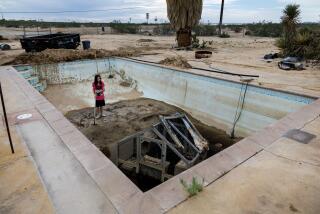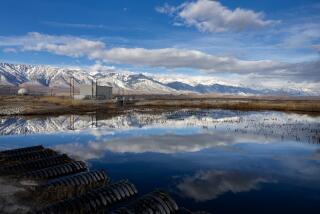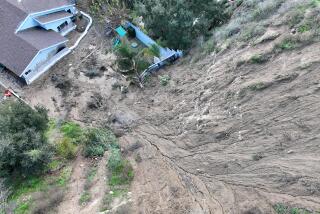Southland Lifestyle Skids to Soggy Halt
- Share via
More than perhaps any other major American city, Los Angeles operates on the assumption of blue skies and clear sailing on the freeways. If you’ve got wheels, clients and a beach out front, you’re there, baby.
But not when torrential rains blow in, tying up freeways for hours, turning surface streets into impassable rivers. Under this week’s extraordinary onslaught, much of Los Angeles has frozen up like rusty gear works: Film shoots have shut down or moved indoors. Commercial fishermen have stayed at port, forsaking thousands of dollars in potential harvest while leaving markets and restaurants short of fresh catch.
The court system--a quagmire even under normal circumstances--has thoroughly bogged down: Absent a juror here, a witness there, entire cases have been set back, jamming up already crowded dockets for the weeks ahead. Schools have closed. Baby-sitters have failed to show up. To that old expression, “You can’t get there from here,” has come a corollary born of many anguishing hours on the 405: Why would you want to?
“My advice to them is to call and reschedule, “ said Jim King, manager of Fox Limousine in Westchester, whose fleet of 30 limos and Lincoln Town Cars ordinarily whisks the glitterati from swank seaside eateries to hilltop manses. That was far from the case on Wednesday as the soggy metropolis struggled to dig out from Tuesday’s deluge--with more rain in the forecast.
“We’re not taking anybody to Malibu Beach right now,” King said.
Inconvenience came in doses both large and small. Sandi Tang figures she got about enough for a decade, starting Tuesday night when she got the news that floodwaters were moving in on her Tommy Tang’s restaurant on Melrose Avenue. Her people were on the phone trying to get sandbags.
“I was completely flabbergasted at that,” said Tang, who pictured flooding as the exclusive province of canyon dwellers. “I said, ‘Sandbagging? Excuse me, did we move the restaurant to Topanga?’ ”
It got to the point Wednesday where the whole roof seemed to be caving in--not literally, but just about. Ceiling leaks at Tommy Tang’s in Pasadena ruined $12,000 in designer walls. Meanwhile, a 1,200-pound shipment of Tommy Tang’s products became stuck in a warehouse in badly flooded Long Beach. That was a problem because it was due at an advertised promotion in New Jersey, Tang said.
On top of all that, the private Hollywood school that her two girls attend called to say it would be closed Wednesday. And for the second day in a row, Tang’s housekeeper could not make the drive from Encino, leaving Tang with not only the children and the business hassles, but also all the cleaning and laundry as she prepared to leave today for a trip to San Francisco.
“I’ll probably do the laundry at 4 in the morning,” Tang said. “It’s pretty incredible.”
For many, there were matters too important to be put off by the elements--even if, in some cases, they were anyway.
Andrea Bishop, a home-care nurse for Gardena-based NSI Home Health Services, usually travels 70 miles a day visiting patients--many of them elderly--who need help with insulin shots, antibiotic injections or other medical demands. On Tuesday, because of jammed freeways, critical time-tables and the need to navigate the city by circuitous routes, she logged 123 miles on her Voyager minivan, requiring 12 hours to complete a series of visits that normally take half that long.
“I was exhausted,” said Bishop, who finished the day at 7 p.m. in Tarzana. “I spent over five hours just traveling.”
Kathy Evans, who coordinates patient care for the same agency, had to take to the road herself on Tuesday when no other nurses were available to clean and flush the catheter of a woman in Torrance. Evans hopped on the San Diego Freeway, went maybe five miles in two hours, and called the patient on a cellular phone to explain the delay.
“At that point,” Evans recalled, “she just said, ‘Don’t bother coming. My street is flooded--the water’s up to the car doors. You’ll never make it.’ ”
Evans ended up counseling the woman about watching for signs of infection and rescheduled the visit for Wednesday, then got caught in another traffic jam--three hours, this time--trying to pick up her husband in Compton.
“It became impossible . . . (without) an ark,” she said.
Among Hollywood’s TV and movie moguls, bad weather usually means a suspension of outdoor filming and a move inside. But for at least one show--CBS’s “Dr. Quinn, Medicine Woman”--that was only a temporary panacea.
While setting up for an interior shot early Tuesday at Paramount Ranch in Agoura, the cast and crew were approached by National Park rangers and asked to evacuate. The site of the shoot, in a rock valley, had become a potentially dangerous flood zone as water poured in over the saturated terrain.
“The creek had risen four feet in 20 minutes,” producer Tim Johnson said. “The force of the water was such that a two-ton metal mock locomotive was washed away.”
The same cast and crew had shot the television pilot for the show a few years ago when the Sepulveda Basin was flooded, Johnson said. But this was far worse. Once that locomotive was gone, the crew wasn’t far behind.
“We heard the word ‘evacuate’ and wasted no time,” Johnson said.
The balance between risk and commercial enterprise is especially difficult for commercial fishermen, who usually embark, rain or shine, from docks in San Pedro. The eight or 10 men who work a 90-foot purse seiner--fishing for squid, mackerel or anchovies in daily trips far up and down the coastline--receive no salaries, said Terry Hoinsky, president of the local chapter of the Fishermen’s Union of America.
Instead, they receive a share of the profits--typically $100 to $150 on a 40- or 50-ton catch of squid, Hoinsky said. Owners of the vessels, who usually double as skippers, may make $2,000 on a good haul.
But on Tuesday, the worst day of the recent storms, virtually all the boats stayed ashore, and no one got paid, Hoinsky said.
“Bad weather will not prevent them from going out unless it’s extremely bad,” she said. “If they’re not able to put that net in the water, they’re not going to be able to fish. But they have to be careful. It doesn’t take much to lose a vessel and to lose lives.”
Although pounding waves create no immediate danger in the courtroom, the intricate workings of justice are just as easily disrupted by a good flood or two, said attorney Charles L. Lindner, former president of the Los Angeles Criminal Courts Bar Assn.
“First of all, you have a lot of lawyers who live in Malibu, Palisades, places like that,” where the storm has wrought much of its havoc, Lindner said. “You also have a lot of judges who live up there. So they’re out of the game, because they literally cannot get to court.”
Not only that, but trial juries draw from populations throughout the county, he said. A case in Santa Monica, say, may go nowhere because jurors are tied up trying to get through the mountain passes from the San Fernando Valley, or down Pacific Coast Highway from Malibu.
Lindner, who practices in Santa Monica, was due at a hearing Tuesday morning on a felony drug case in court in downtown Los Angeles. He got up at 5:30, saw the squall outside, began listening to traffic reports and carefully weighed questions of duty versus the extreme hassle that awaited him.
“Everything was blocked off or taking three times the normal commute,” he said. “And there’s a reasonable chance that somebody (else) is going to be missing . . . police officers, the prosecutor, witnesses for the pre-trial motions.”
Another factor: Lindner walks with an artificial leg. It is his opinion that Los Angeles is not designed for poor weather, particularly when one is disabled. There aren’t hand rails. Roads covered with months-old oil get slick.
“You get on a hill like Temple (Street), trying to get into court, and you might as well be on the roller coaster at Magic Mountain,” he said.
So he stayed home. And his case, along with untold numbers of others, was pushed back in one gargantuan example of the Domino Effect. His client would spend a few more days in jail before having his arguments heard.
“It’s a huge headache,” Lindner said. “The court system just stops working effectively. There are all sorts of courtrooms where things just aren’t happening.”
Headache seemed to be the operative--or non-operative--word.
Tricia Szeliga, a Topanga Canyon artist, had to break away from her preparations for an art show in New York to clean out her flooded studio. “It’s pretty hard to work in clay with everything wet,” she lamented.
Not far away, Malibu’s Pet Headquarters had to be evacuated on Tuesday. Six puppies, a cat and five kittens went home with a store employee. Trouble was, the store wanted to get them back on Wednesday, but couldn’t find a way to transport the animals across Cross Creek Bridge, which was closed.
At that same bridge, a UPS driver in Malibu was heard on the phone to his home office, trying to explain why deliveries were slow: “I’m sorry I didn’t pull out a helicopter and get an aerial view.” And then he made the point more clearly: “You can’t! They won’t let you get to the freeway.”
* STORM COVERAGE: Related storm coverage inside. A3, A18-A20, B2, D3.
More to Read
Sign up for Essential California
The most important California stories and recommendations in your inbox every morning.
You may occasionally receive promotional content from the Los Angeles Times.










